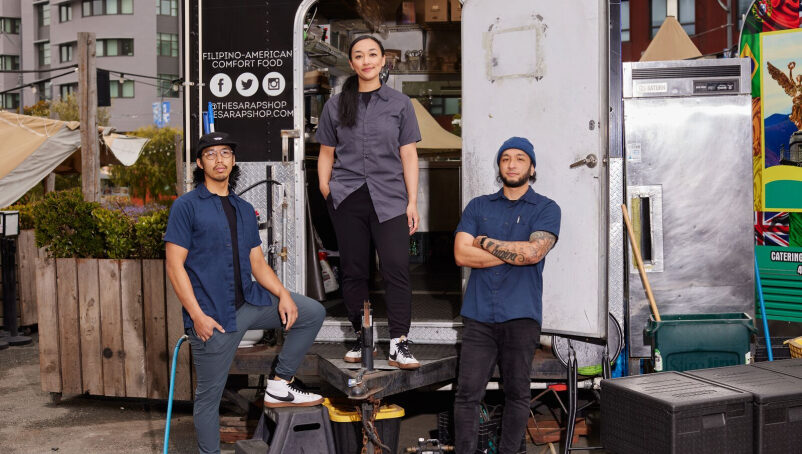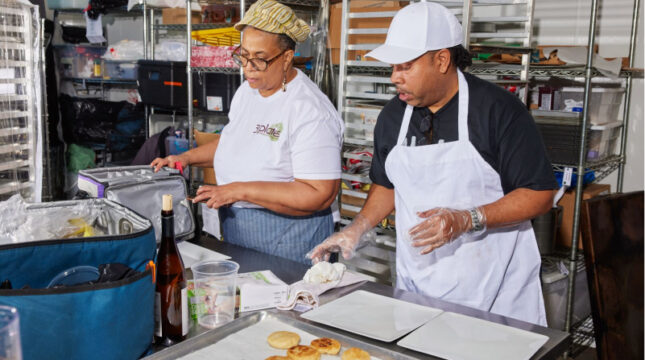Who needs Washington State food manager certification?
Most food establishments in Washington State must have at least one Certified Food Protection Manager on staff. You must hold a food protection manager certification if you do not have any employees.
The CFPM does not need to be on-site during all hours of operation, and they can act as the CFPM for more than one establishment (such as a restaurant with multiple locations).
A few types of food businesses are exempt from this requirement, including those which:
- Serve or sell only prepackaged food.
- Prepare only non-TCS (Temperature Control for Safety) food.
- Heat only commercially processed, ready-to-eat food.
- Serve food temporarily at short-term events, like fairs and festivals.
If the certified food manager stops working for your restaurant or food business, you have 60 days to find and hire another CFPM.
How to get Washington State food manager certification
To obtain food manager certification, Washington employees must complete a food safety training course accredited by the American National Standards Institute (ANSI). You can find a list of approved courses here.
CFPM courses cover a number of topics related to proper food handling, such as:
- Duties of the person in charge.
- Demonstration of knowledge by the PIC.
- Microbiology basics.
- Foodborne illness prevention.
- Hygiene and sanitation.
- Hazard Analysis Critical Control Point (HACCP).
- Time and temperature safety controls.
- Food safety regulations.
Participants must pass an exam on the topics covered in the food protection course to obtain their certification.
In Washington, you or your employees can typically finish the food manager certification training course in four to eight hours. The exam itself takes about one to two hours to complete.
Once you successfully pass the exam, you might receive your certificate instantly or it could be sent to you by mail.
Restaurant owners are responsible for keeping a copy of their food protection manager’s certification on-site. This certificate must be displayed or kept on file and made available upon request during health inspections.
If the certificate is lost or damaged, the food manager can contact the examination provider to get a replacement.
Insurance for Washington State restaurants, caterers, cafes and food service businesses
Consider Washington business insurance to help protect your business from everyday risks. Many restaurant owners in the state consider the following insurance coverage options:
General liability insurance
General liability insurance can help protect your restaurant from incidents like property damage or injuries to third parties.
It’s even more critical in the food service industry, where food service general liability insurance can also include restaurant-specific coverage for risks such as foodborne illness. Should a customer fall ill due to contaminated or improperly prepared food, this insurance could help.
Additionally, if your restaurant serves alcohol, consider Washington State liquor liability insurance. It’s designed to help cover the unique risks of serving alcohol, such as potential legal and financial challenges.
Workers’ compensation insurance
Nearly every business with employees in Washington State must carry workers’ compensation insurance. This type of insurance can help cover expenses such as medical bills and lost wages if an employee gets injured on the job.
It can also support employees during recovery and help protect your business from losses of workplace accidents. View Washington’s Employers’ Guide to Workers’ Compensation Insurance for more information.
Commercial property insurance
Commercial property insurance can help safeguard your business’s physical assets. Whether it’s damage from unexpected events like electrical fires or burst pipes, this insurance could help with the repairs or replacements. It can cover the building itself, equipment, inventory and furniture.
Commercial auto insurance
For restaurants using vehicles for business, commercial auto insurance can help cover medical expenses, property damage and other losses from accidents involving work vehicles.
Washington has a mandatory minimum coverage requirement for all vehicles: $25,000 per person, $50,000 per accident for bodily injury and $10,000 for property damage.
How much does Washington State food manager certification cost?
You’ll pay around $50 for the training portion of the Washington CFPM course. To get the training materials and cover the cost of the exam, the price usually falls between $100 and $120.
You or your employees can complete Washington food manager courses entirely online or through in-person classes as long as an ANSI-accredited program provides the training and exam.
Restaurant owners are not required to cover the cost of the food safety manager certification. A certification is considered the employee’s property, and they are permitted to use it at other food establishments if they change jobs.
Washington State food manager certification renewal
Renewal is required every five years for a Certified Food Protection Manager. Washington State requires employees to retake the training course and exam to renew their certification.
This process is important to ensure that food managers stay up-to-date with the latest food safety practices and regulations. It not only reinforces their existing knowledge but also introduces new and relevant information in food safety.
Reciprocity of Washington State food manager certification
If an employee already holds a food manager certification from another state, they may be eligible for reciprocity in Washington — but there’s a key condition. The certification must be from an ANSI-accredited program.
This policy acknowledges the qualifications of food managers who have completed rigorous training elsewhere and aligns with Washington’s high standards for food safety. It’s a great way for professionals who have moved to Washington to continue their careers without interruption, as long as their previous training meets the state’s stringent criteria.
Food manager certification vs. person in charge
Washington restaurants and food businesses must have a person in charge on-site during all hours of operation. The PIC can be the owner or other designated employees.
Each PIC must be capable of demonstrating Active Managerial Control (AMC) to health inspectors through their knowledge of food safety. They may fulfill this requirement in one of the following ways:
- Having no violations of key risk factors during the inspection.
- Responding correctly to the inspector’s questions about food safety.
- Being a Certified Food Protection Manager.
The CFPM is responsible for training any PICs who don’t have a food protection manager certification. This training must prepare them to demonstrate their knowledge of food safety practices during inspections successfully.
Food manager certification vs. food handlers card
Washington requires every food worker to have a State Food Worker card before they handle or serve food to the public. This includes kitchen staff, servers, bussers, hosts, bartenders, and other food service employees.
Certified food protection managers must also meet Washington food handler license requirements if their job involves handling or serving food in any capacity.
If you provide on-site food safety training, employees can work up to 14 days before getting their official card. Otherwise, your employees must have this certification before working at your business.
To get a Washington food worker card, employees must complete a training program through their local health department and pass a related exam. The state also offers one approved online training option.
Food handlers, food managers, and persons in charge are all crucial for your business’s protection. Their training in correct food preparation and handling methods minimizes the risk of foodborne illness.
How NEXT helps support Washington restaurant owners
NEXT is 100% dedicated to helping small businesses thrive. We provide tailored Washington restaurant insurance policies designed for small businesses and self-employed business owners.
It only takes about 10 minutes to get a quote, review coverage options, choose your policies and download a certificate of insurance.
Our team of licensed insurance advisors is standing by to assist you if you have any questions along the way.
Start a free quote with NEXT.





